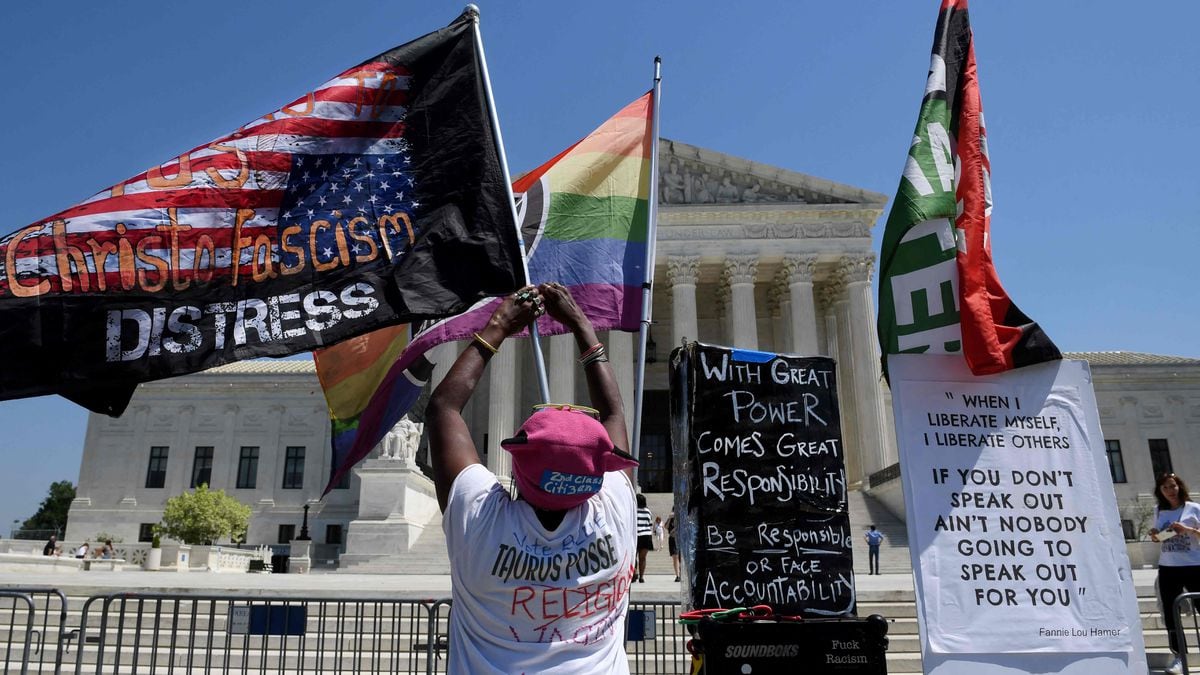Goodbye to Roe vs.
Wade: the right to abortion in the US is repealed. 1:39
(CNN) --
I've been writing for a long time about the delicate situation businesses find themselves in, especially in the last two years, when political and cultural fissures in the United States force virtually every public figure to take a moral stand.
Why does every CEO have to weigh in on every Twitter
hashtag
and trend?
Can't we let Coca-Cola be Coca-Cola?
There was a time when the answer was yes: In the pre-social media era, it might not have mattered if the CEO of your supermarket didn't make a public statement about a Supreme Court decision.
There were tracks, and we almost always stayed on them.
How many people would be affected by banning abortion in the US?
2:41
But a couple of things happened to blur the lines between companies and their consumers:
First, American companies got much, much bigger.
Your local store became a Walmart or a Target, or a chain owned by one of the few national supermarkets.
Market consolidation.
Then social media gave those brands a whole new way to target us with their ads.
In return, we the people got free two-day delivery and a virtually unlimited inventory of products to choose from.
The more we put our lives online, the more access companies would have to us, to find out what we want and better satisfy those wants.
US companies entered the social media scene awkwardly, like around the time all of our parents decided to join Facebook and turn that site into, well, modern Facebook.
Companies rushed to hire young social media managers who could "engage" with people.
They wanted to participate.
And we couldn't stop them.
So it's no wonder some of us wonder where the voice of corporate America is when the conversation turns to darker, more complicated issues.
advertising
As the Times reported over the weekend, the companies had more than a month to come up with a response to the overturning of the Roe ruling.
Most of them, including some who sided with Black Lives Matter or championed LGBTQ rights, have not said a word about dissolving the federal right to abortion.
ANALYSIS |
Supreme Court brings a divided nation closer to the breaking point with new abortion fights
At best, some companies say they will fund their own employees' abortions if they have to travel out of state for the procedure.
That's not insignificant, but it also misses the point: The people most affected by the end of Roe won't be the ones who work at a Wall Street bank or a tech company.
Perhaps the topic is too polarizing, and not worth the risk of offending customers on one side or the other.
I mean, just look at poor Bob Chapek, the Disney CEO who came out (albeit coyly) for LGBTQ rights and led that $175 billion global media giant into a bad spot. ..
Oh wait.
It turns out that Disney is still a $175 billion global media giant and home to such beloved franchises as Star Wars, Marvel, Pixar and ESPN.
Did Chapek's disputes with the Florida governor increase Disney's legal bill and upset his PR team?
Sure it was, but it was also the right thing to do. Whether you define "right" as a good idea for the world or good for business, Disney fans and employees made it clear that they wanted the company to take a stand.
So here's my suggestion to corporate America leaders concerned about defending the reproductive rights of half of America's population: give it a try?
Like, for example, try the concept of moral leadership and see how it feels?
Because they told us they wanted to participate, and that profile picture with the rainbow flag is starting to make me think that they just wanted to, I don't know, pretend they were defending human rights when they thought the fight was already won and the price of their shares it was being inflated by monetary policies designed to prevent the economy from collapsing under the pressure of a once-in-a-generation pandemic.
And maybe now that inflation is weighing on earnings and we're in a bear market, that bottom line risk is a little scarier than it was in 2020?
Just an idea.
AbortionCompaniesRoe v.
Wade








/cloudfront-eu-central-1.images.arcpublishing.com/prisa/H4OQQFWP7M2WIJYAVWO45FAOKI.jpg)






